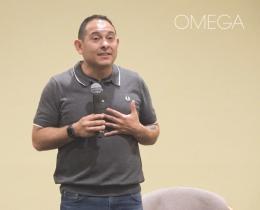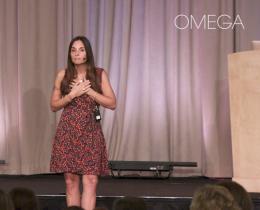Most people do not live in a cloistered monastery in the middle of nowhere, free to practice awareness in solitude. They, like you, live in a community—where the people they love and the noise of the world attempt to hook their attention in every possible way.
Even those who do live in an ashram or a monastery, a space created almost exclusively for practicing awareness, will tell you that their world is far from being distraction-free. So, regardless of where you are, coming into and out of awareness is a universal human condition.
Here’s a personal story that illustrates this ongoing challenge quite well. In January, I looked at myself and said, “Miguel, you are perfect, and I love you exactly the way you are—and I think you would be healthier and enjoy your life even more if you got back into running.”
In years past, I had run quite regularly, but I had not done so in some time. Consequently, I dusted off my old sneakers and went for a run. I made it two-thirds of a mile before I had to stop. I could feel my heart pounding, and it took me some time to catch my breath. I was surprised at how difficult it was for me to make it just that far.
At that moment I had a choice: I could call myself a “lazy bum” and judge myself accordingly, or I could realize that this was just my starting point: “Be gentle with yourself, Miguel. This is where you are today, and you are perfect exactly as you are.” My goal, with practice, was to be able to run five miles without stopping by the end of May.
So, without any domestication or conditional love, I began my running routine. Before the end of April, I’d met my goal! I was enjoying myself very much. But like any person who gets wrapped up in work, family, and life, I got distracted, and my running routine fell to the wayside.
When I was able to start running again a few weeks later, I expected to be able to run five miles without stopping, as that was the mark of my recent achievement. But I could only run two! At that moment, the disappointment seeped in, and I could hear the voice of my internal judge yelling, “What is the matter with you?! How are you not able to still run five miles?”
My mind immediately blamed external circumstances and other people for this, then I watched as I got angry with myself for not keeping up with my own benchmark.
Self-judgment in the form of “you lazy bum!” filled my mind. Upon hearing my narrators say this, my awareness kicked back in, and I realized the old ways of self-domestication were attempting to regain their foothold, this time with new conditions.
Had I continued on this road of self-judgment, I would have placed my, “Miguel, the good runner” persona on a pedestal, making it a new model for self-domestication. From this point of view, I would need to run five miles just to consider myself acceptable, and I wouldn’t consider myself perfect as I worked toward that goal. As a result, my motivation would become corrupted, as I turned the noble idea of getting healthier via running into a new form of self-domestication.
Every time we use domestication and conditional love as a motivator for change rather than unconditional self-love, suffering is inevitable.
This example shows us how subtly the habits of self-judgment and self-domestication can hook us. Without awareness, we unconsciously create the expectations of who we think we are supposed to be based on the agreements we have made. For any expectation that goes unmet, we judge ourselves accordingly.
To be clear, there is nothing wrong with having goals; they are motivators, or focal points, for us to create the existence we desire.
The problem lies in the fact that we use goals as a reason to either love ourselves or reject ourselves, corrupting them into instruments for conditional love. Thus, our happiness relies on our “success,” and because this type of success mainly exists in the future and is rarely, if ever, achieved, we are never able to enjoy who we are at this very moment.
We spend so much time looking ahead and waiting for happiness to come that we forget to look around and enjoy who we are right now. If we do manage to achieve momentary success by this standard, we live with the constant fear of losing it.
Self-judgment is the root of our suffering. When we self-judge, we aren’t able to see and enjoy who we really are at this very moment, because we are constantly evaluating ourselves by an illusory standard set by our own agreements. We have been conditioned to believe that our self-acceptance relies on our accomplishments.
When we reach our goals, our self-esteem rises; when we don’t, we think less of ourselves. This is how the great majority of people interact with one another, imposing beliefs onto one another and subjugating themselves to the judgment of others. This is how the illusion of conditional love spreads.
When we judge another, we are punishing that person for agreements they never made. Through our judgment, we try to force them to make the agreement we want them to make, thus imposing our beliefs on them.
How can we stop judging ourselves and others? By accepting ourselves just the way we are right now. Once we accept ourselves completely, we will stop judging others. You cannot give to others what you have not given to yourself.
It is through the practice of awareness that we are able to see the perfection that exists in others and ourselves.



